This guide ranks the top 10 most beautiful states in Nigeria and their capitals based on key criteria, including economic performance, infrastructure quality, human development indicators such as education and healthcare, and governance.
READ ALSO: Top 10 Richest Local Government In Enugu state, Nigeria
Top 10 Finest States In Nigeria And Their Capitals
Here are the top 10 most beautiful states in Nigeria, including their capital:
| Rank | State | Capital |
|---|---|---|
| 1 | Lagos | Ikeja |
| 2 | Rivers | Port Harcourt |
| 3 | Akwa Ibom | Uyo |
| 4 | Anambra | Awka |
| 5 | Delta | Asaba |
| 6 | Ogun | Abeokuta |
| 7 | Imo | Owerri |
| 8 | Abia | Umuahia |
| 9 | Kano | Kano |
| 10 | Ondo | Akure |
READ ALSO: Top Oil Fields In Nigeria And Their Location
1. Lagos State
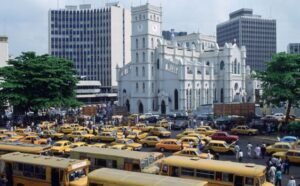
Lagos State, with its capital in Ikeja, is widely regarded as Nigeria’s most beautiful and most developed state. It is the nation’s top economic and commercial center, with a Gross Domestic Product (GDP) of about US$259 billion (PPP) in 2023.
This makes it the second-largest city economy in Africa, after Cairo. The state’s economy is growing fast. It expanded from N19.65 trillion in 2023 to N27.38 trillion in the first half of 2024.
In 2025, the GDP is expected to rise to N66.47 trillion, with a growth rate between 5.02% and 6.49%. Lagos is Nigeria’s most urbanized state. It has modern roads, rail lines, and real estate projects.
Though traffic and housing are issues, the government is working to fix them. Good governance also plays a part as Lagos plans to generate N2.79 trillion in revenue by 2025.
It focuses on sustainable growth and infrastructure. In education and healthcare, Lagos ranks high. Many Nigerians move to the state for better jobs and living conditions. Still, inflation, at 34.2%, is a challenge.
2.Rivers State
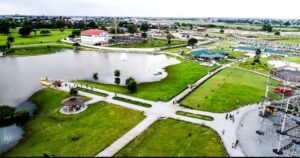
Rivers State is one of Nigeria’s most economically advanced and developed regions, with Port Harcourt as its capital.
Known as the “Treasure Base of the Nation,” it contributes to Nigeria’s oil and gas industry. In 2025, it ranked as the second richest state, just after Lagos.
Governor Siminalayi Fubara’s ₦1.188 trillion budget for 2025 shows a clear commitment to development. Over ₦324.5 billion is set aside for infrastructure, with ₦38.85 billion for shoreline protection and ₦50 billion for hospital upgrades.
The state is also investing ₦30 billion in zonal secondary schools. Port Harcourt, the 4th most populous city in Nigeria, is a hub for industry and trade.
Rivers State generates over ₦100 billion in Internally Generated Revenue, proving its growing economy. Its funding sources include FAAC, VAT, mineral funds, and IGR.
Efforts in education and social welfare continue, with ₦2.5 billion for women’s empowerment and ₦3 billion for youth centers. However, life expectancy is at 54–57 years, and the government is actively addressing healthcare needs.
3. Akwa Ibom State
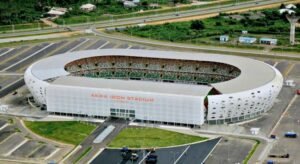
Akwa Ibom State is currently seen as one of Nigeria’s most attractive destinations, with Uyo as its capital. Its strong economy, bold infrastructure plans, and investment in human development make it a standout.
Economically, Akwa Ibom is one of the highest oil-producing states in Nigeria. The state approved a N955 billion budget for 2025, with N655 billion allocated to capital projects.
Internally Generated Revenue (IGR) is expected to reach N80 billion, up 28% from 2024. And, over N220 billion will be used for road construction to boost connectivity and economic activity.
The state agriculture is also booming. With over 40,000 hectares under cultivation, the state grows coconut, rice, cassava, cocoa, and oil palm.
Akwa Ibom is also Nigeria’s second most attractive destination for foreign direct investment. Plus, human capital development is a priority. The Ibom-LED center has trained 4,000+ people in ICT, fashion, agriculture, and more.
Healthcare and schools are being upgraded across the state. Infrastructure is rapidly expanding. Roads are under construction across all districts. The Victor Attah International Airport is being expanded with a new Aviation Village.
READ ALSO: Top 10 Agriculture-Producing States In Nigeria (2025)
4. Anambra State
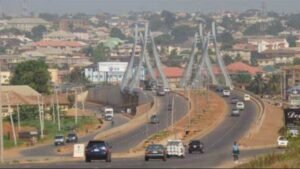
With Awka as its capital, Anambra State is one of Nigeria’s best-performing states in terms of economic growth, governance, and infrastructure.
It has the fourth-largest economy in the country, powered by thriving commerce, agriculture, and industry. Onitsha, home to the largest market in West Africa, serves as a major commercial hub, attracting thousands of traders every day.
Around 70% of the state is urbanized, with cities like Nnewi and Ekwulobia boosting their economic strength. The 2025 budget stands at ₦607 billion, and over ₦200 billion is put aside for major road projects like the Amawbia-Imo road and the Ekwulobia flyover.
In governance, Anambra ranks top three in e-governance in Nigeria (2025 CIAPS CGPI), promoting transparency through digital platforms.
The state is also home to one of Nigeria’s best-performing educational systems, with free public education helping reduce out-of-school children to the lowest number nationwide.
The Anambra International Cargo Airport, opened in 2021, has improved trade and logistics. In health, the state has the second-lowest infant mortality rate after Lagos.
5. Delta State
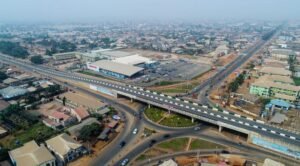
Delta State, with its capital in Asaba, ranks among the top four largest economies in Nigeria as of 2025. This impressive standing is driven by strong governance, economic diversification, and infrastructural growth.
Delta is Nigeria’s leading oil-producing state, with oil and gas contributing about 48.7% of its GDP. Yet, more than 51.25% of the economy comes from non-oil sectors, like agriculture, services, manufacturing, and technology.
The agriculture sector alone has grown at 13.3% annually for six years, helping to create over 257,000 jobs. Under Governor Sheriff Oborevwori, Delta has invested heavily in infrastructure: over 500 roads covering 1,500 km and 933 km of drainage to tackle flooding.
The 2025 budget commits N230 billion to roads alone. Industrial parks and SME support are also boosting business and employment. Also, the 2025 budget allocates N67.42 billion to education and N30.55 billion to health.
Programs for women and youth empowerment, along with social safety nets, have also helped reduce poverty. With a people-focused budget of N936 billion, Delta’s MORE Agenda promotes transparency and investment. These efforts position Delta State as one of Nigeria’s finest and fastest-growing states in 2025.
6. Ogun State
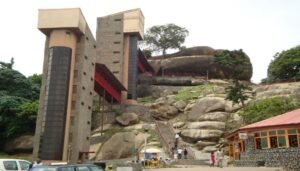
Known as Nigeria’s Industrial Capital, Ogun State, whose capital is Abeokuta, certainly lives up to the name. In 2023, the state generated ₦146.87 billion in Internally Generated Revenue (IGR), ranking 4th nationwide and among the top five non-oil states.
Its 2025 budget has soared to ₦1.05 trillion, a massive leap from ₦335 billion in 2020. Infrastructure is a major focus. The state has allocated ₦284.46 billion (27% of its budget) to roads, transport, and utilities.
Over 600km of roads have been completed, and the Gateway Agro-Cargo Airport nears completion. Projects like the Lagos-Ota-Abeokuta road will also ease movement and boost trade.
Education gets ₦177.83 billion in 2025, while healthcare receives ₦134.54 billion. Ogun’s government is upgrading hospitals, revitalizing 80 primary health centers, and expanding schools, making quality health and education accessible.
Governance is transparent and efficient. Personnel costs are capped at 12% of the budget. The state has blocked revenue leakages and fully digitized its tax system. It is, indeed, one of Nigeria’s finest states.
READ ALSO: When Did Nigeria Gain Independence From British Colonial Rule?
7. Imo State
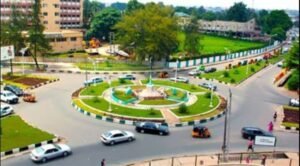
Imo State is steadily becoming one of Nigeria’s most admired states, with Owerri as its capital. Its economic growth, strong infrastructure, and human development efforts are hard to ignore.
In 2025, the state passed a robust N756 billion budget (around $1.8 billion), called the “Budget of Expanded Economic Opportunities.”
Impressively, over 85% of this was set aside for capital projects, roads, electricity, agriculture, and industry. Projects like the Orashi Energy Free Trade Zone and the Control Post flyover are already changing the state’s economy.
Tourism and food security are also key areas of focus. Owerri now ranks as the 6th best-performing city in Nigeria. Infrastructure is improving. A major 37 km expressway has eased traffic. Power supply is also getting better, due to the Imo State Electricity Distribution (ISED) project.
In human development, Imo leads the country in skill-building programs. Health and education are also improving, with new health centers and better schools.
However, living in Imo is not cheap. It is currently Nigeria’s most expensive state, with a 17.77% inflation rate in early 2025.
8. Abia State
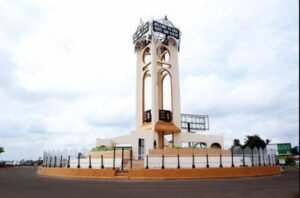
Abia State is rapidly growing and has Umuahia as its capital, ranking among the top 10 finest states in the country. The 2025 budget of ₦750 billion, an increase of 30% from 2024, is a bold move. About 82% (₦611.7 billion) goes to capital projects.
Internally, the state targets ₦120 billion in IGR for 2025. That’s a 207% increase from last year. Aba, Abia’s commercial center, is being revived.
Projects like the Abia Industrial and Innovative Park (AIIP) and the Abia Transport Terminal (ATT) aim to restore its industrial strength.
Infrastructure is improving fast, with roads like Port Harcourt Road (6.8 km) and others across the state being built. The Abia Airport at Nsulu and a 5-star hotel in Aba are underway.
Education gets ₦148.57 billion in 2025. Health takes 15% of the total budget. Over 51 schools will be renovated, and 184 wards will get reading rooms. Abia also focuses on governance, security, and business. It wants to top Nigeria’s ease of doing business rankings.
9. Kano State
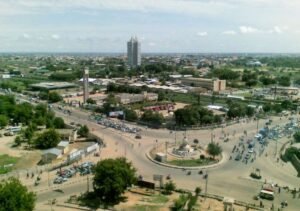
Kano State is one of Nigeria’s finest and most prominent states, especially in the northwest. Kano plays an integral part in Nigeria’s development.
The state is a major commercial and industrial hub, contributing significantly to the national GDP through trade, manufacturing, and agriculture.
Its markets, like Kurmi and Sabon Gari, are still essential to the economy, even as the startup scene declined by 34.1%, ranking 7th nationally in 2025.
Governance is guided by the Kano State Development Plan (2020–2025), focusing on jobs, poverty reduction, and sustainable growth.
With a 2025 budget of ₦549 billion, Kano invests heavily in human capital. Education receives ₦168 billion (31%), well above UNESCO’s 26% recommendation.
Healthcare gets ₦90.6 billion (16.5%), while infrastructure, including roads and water, gets ₦70.7 billion (13%). Security and justice are also prioritized with a ₦23.5 billion allocation.
READ ALSO: When Did Nigeria Gain Independence From British Colonial Rule?
10. Ondo State
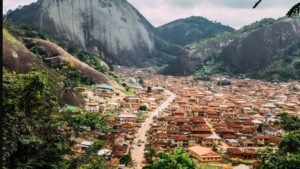
Ondo State, home to the capital city of Akure, is regarded as one of Nigeria’s 10 most beautiful states. Ondo was recently rated the 5th most financially self-sufficient state in the country.
The 2025 budget, titled the “Budget of Recovery,” is at a robust N698.659 billion, and over 62%, about N433.622 billion, is for capital projects.
Of this, N238.572 billion is specifically allocated to infrastructure, including roads and public utilities. Education receives N77.024 billion, aiming to improve schools, teacher training, and literacy rates.
In agriculture, N56.102 billion is earmarked to empower farmers and enhance food production. Healthcare gets N46.016 billion, with Ondo recording Nigeria’s lowest multidimensional poverty rate at just 27%.
Also, the government is spending N125.456 billion on public finance and administration to provide transparency and accountability.


I love Naija